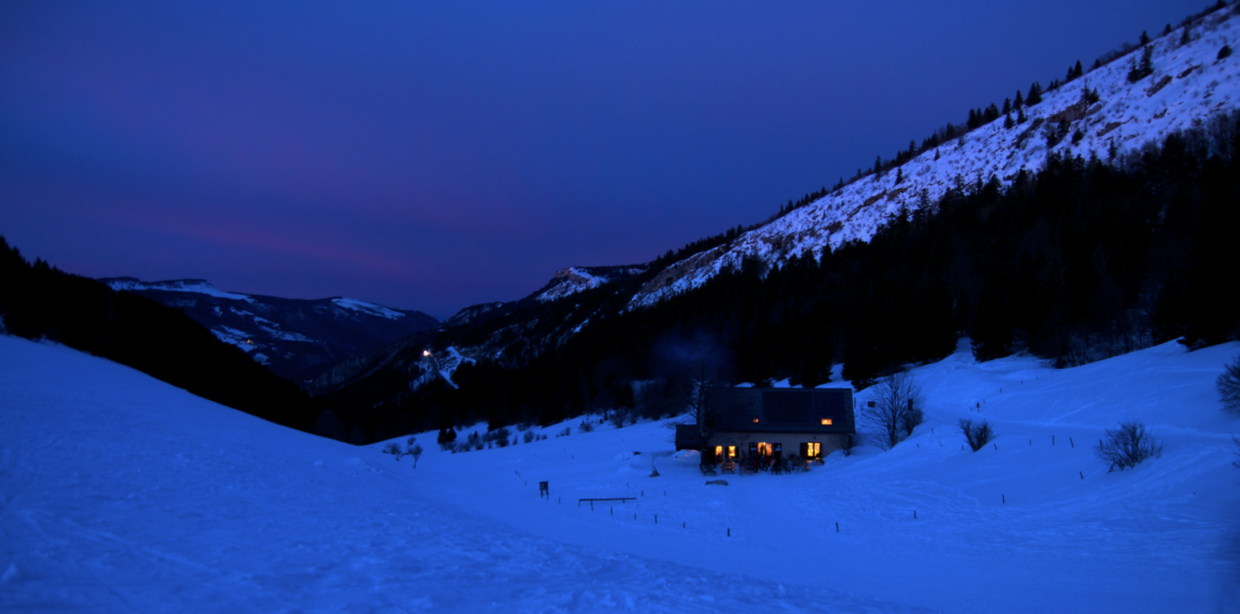On Memory’s Ghosts and the Search for the Perfect Writing Space
Karen Salyer McElmurray: “Some days in my writing room, I really can hear my own breath.”
I spend as much as nine hours a day in the 12′ x 9′ room I call my writing space. Mornings, I write something, be it a dream in my journal or a prose poem or a start of something—always keeping in mind what author Larry Brown once said: if you’re not writing much, then sit there for four hours.
Afternoons, it’s in this space that I teach an online writing class for visual artists. I plan classes there, comment on manuscripts there. I practice meditation in this space. It’s there that I imagine what could be, a new memoir I tell myself is about joy.
I love my writing space, but lately I am finding it difficult to sit still in there. I move from the small sofa to the desk chair. I count photographs I have tacked to the walls. I look at a photo of myself from a reading some years back. I head downstairs for a second cup of tea. I invite the dog in and toss a ball for her into the hall again and again. I long for an emptiness my own creative space doesn’t allow.
This week I’ve scoured websites about artist’s residencies to which I am going to apply for winter, next spring and summer. I haven’t been to one in a decade, since it’s hard to leave home, partner, and aging Carolina dog. Nevertheless, I’ve narrowed the dozen possibilities to three incredibly appealing places.
Two miles off the coast of Maine, the first residency means open fields, meadows, ocean vistas with blueberry patches, forest dells. I will have no running water or facilities, but will have my own small wood stove for cool nights.
The second residency, in New Mexico, is 21,000 acres surrounded by towering red rock walls. It is described as a community of eight rustic, individual casitas a short walk from a fire pit and a star gazing habitat.
Finally, in the quiet countryside of Northern Ireland, in County Monaghan, there will be acres of forest, a lake. Seen on walkabouts, squirrels, pine martins, foxes, badgers, fish, otters, swans, owls, woodpeckers, all manner of small birds, hares, rabbits, and a flock of wild deer. And in the lodging, a small hall for depositing of muddy boots.
These three choices—and many of the other dozen places I’ve researched—have similarities. I want distance, as well as the possibility of community, a dinner with others each evening, a counted on camaraderie. I could also pass fellow artists and writers on a beach, or crossing a field of wildflowers. We could stop and name deer or birds in flight, and we might even listen to one another’s writing or glimpse new paintings each evening, but the majority of my day will be alone.
Alone. Alone. The word is moist. It tastes of salt. Of red dust. Of emptiness. I want my spirit echoing with space and a beautiful silence. I will hear only myself breathing.
Some days in my writing room, I really can hear my own breath. The in, pause, out, pause of a meditation. The exasperated sigh when I don’t save and lose a page of writing that might have been good.
More than my own breath though, I can hear the breathing of all the other people I’ve invited into this room with me. Taped to a file cabinet, there are decorative magnets—Frida Kahlo next to Glenda, the Good Witch. Alongside them, there’s a recipe for a chicken and mushroom soup that summons my Granny via her own handwriting. There are calendars for the coming fall semesters.
There are quotes from two of my favorite authors. Annie Dillard. Virginia Woolf. A quote from my oldest writer friend, Vicky. We live in contradiction. We live between the infinite nature of the spirit and the brutal specter of genocide and illness. It’s amazing that we can hold onto any joy at all, and yet joy is insuppressible.
So full of memories, my dear friend Carlyle said when she visited me last summer. I stood with her in my writing room, showing her photos she’s never seen. My son. Me when I was thirty, sitting next to my granny on the steps of a house taken by a public highway. Me when I was forty, standing beneath a waterfall. She’s right. The room is jam-packed, full to the gills with photographs and books and postcards. With boxes of greeting cards and Tarot decks. With tapes of old creative writing lectures from a million years ago, though I no longer own a tape player.
The room is so full of what was, I can hardly find room any more to sit in front of my laptop and write new pages about what is in here and now. I’m thinking and thinking of the new memoir about joy, and the writing space needs it bad, breathing room. Room for the memoir itself to breathe, to grow into a book about what it means to be happy.
Is it possible for a memoir to do that, to be about the present rather than the past? To be about what is rather than what is remembered? I long to fill up box after box, take all of them to the recycling center. I could leave the room beautifully empty. Is that even possible? I don’t doubt I’d leave the boxes at the recycling center, then drive back right away to retrieve them.
*
Remembrance. Memory. Both of those spring from Mnemosyne, the goddess of individual and collective memory. Mnemosyne is source of language and writing, her name taken from Mneme, a Greek word meaning “remembrance.” I seem to worship at her feet.
All that I have written, it seems, comes from a kind of reverence for memory. A novel with its source the memory of women in my family and a story I knew of a boy named Andrew and his love for another boy named Henry Ward. Still another about a fortune teller who can’t forget the loss of her mother. My memoir, a whole story spun from what I can remember and what I can’t about my son’s relinquishment to adoption—memories woven of blood and breath, grief and love.
Is it possible for a memoir to do that, to be about the present rather than the past? To be about what is rather than what is remembered?And this new essay collection, I Could Name God in Twelve Ways. Essays from the goddess of memory via travel and lost love. All that I have written, sprung from places and people who have left indelible marks on my spirit, all of it settled in my memory and come alive via writing. By the nature of my work, I am perpetually haunted.
In my writing space, there are multiple ghosts, human and otherwise. On a narrow space of wall, there’s a photo of my granddaddy standing on a dock, holding a fishing pole and freshly caught bass. I have no idea where this dock is, nor when the photo was taken, but he is smiling and proud, so different than the last time did I see him, at a hospital.
He was sixty seven years old that last time and he’d had a stroke. My father had me stand next to the bed, touch his face. I was nine. This how being alive feels, my father said, a memory that comes alive in the photo of him fishing.
Below that photo, there’s one of my granny as a child. She’s standing out in a bare dirt yard, a chicken in her arms. My Banty hen, she tells me years and years later, when I was little.
To the right of my desk, magneted to the file cabinets, a photo of my mother, still alive, lying in the bed at the nursing home where she lived as an Alzheimer’s patient. Who knows what ghosts of her own life spoke in her head? A photo of my son standing by an Saguaro cactus in Arizona, long before I met him—his face already one I saw in my dreams. All the ghosts of what was and what will be.
I imagine the residency in Maine, how my grandparents’ ghosts will travel on the sea, coming to visit me in the faraway. Or in New Mexico’s red dust, there will be other ghosts I know as well as I know the back of my own writer’s hand.
And how could Ireland not be haunted by the ghosts of all my ancestors from Appalachia in the mountains of Eastern Kentucky? All the ghosts, determined to never, ever leave me alone.
Once I had a friend who was a novelist. When he was hard at work at a novel, he not only shut the door, he locked it, and woe be to those who knocked with an important question. I’ve been that friend, all the happier if my husband isn’t home at all, for eight hours if possible on a writing day.
Each day, the ghosts of my granny and my mother and all the other ancestors whisper to me as I read and write.A writing residency is in part a community. Once at the Millay Colony in upstate New York, I met a woman who made sculpture from intricate paper cutouts. In the evenings, she and I and the other three residents walked to the grave of Edna St. Vincent Millay We laughed and sipped from our paper cups to left Edna gifts of wine and poems.
Her ghost followed us, hungry for our company, as we made our way back to our studios. At the Virginia Center for the Creative Arts, I wrote for hours, then after supper, joined a group of the other artists. We walked a back road past fields and houses in the evening sunlight, our conversation full of everything from our days.
*
In my little writing room, I am alone and I am not alone. My husband works from home, and I can hear him come up from the basement, hear him make his lunch. He stops by my room and says hello from the hallway. My dog stretches out at my feet and sighs in her sleep.
Each day, the ghosts of my granny and my mother and all the other ancestors whisper to me as I read and write. They tell me about who they loved and why, and about why they could not love more fully. They tell me about myself, how I was a million years ago, and how they see me now. They tell me about the sorrows of the lives they led, and the sadness they feel now.
You are not alone, they say. They reach out their spirit hands, but can never quite touch me. Forgive us, they say, and I write and write, an act of absolution and the longer I write, an act of joy. Alone. They make sure I take that word inside my mouth, hold it on my tongue.
______________________________

I Could Name God in Twelve Ways by Karen Salyer McElmurray is available via




















